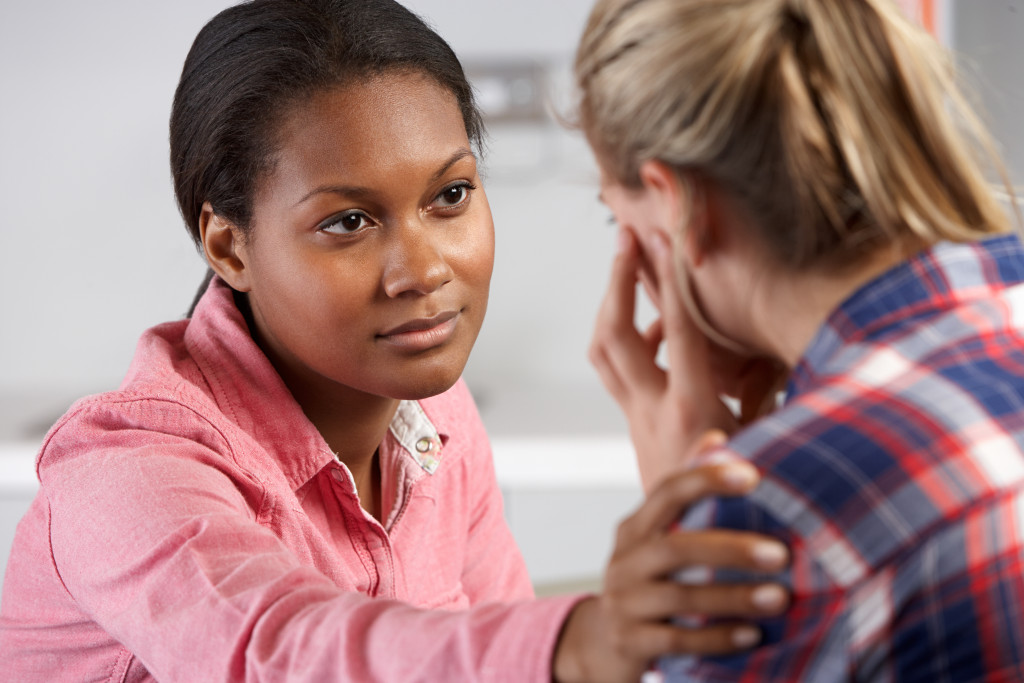- Educate yourself about bulimia nervosa and its symptoms, and encourage professional help for your loved one.
- Create a supportive environment, provide emotional validation, and focus on promoting positive behaviors and healthier coping mechanisms.
- Offer love and support, and be patient as recovery is a process that takes time, and care for yourself too.
- Develop an understanding of the telltale signs of bulimia nervosa so proactive support can be given.
Caring for a loved one suffering from bulimia nervosa can be an emotionally challenging and draining experience. Bulimia nervosa is an eating disorder characterized by recurrent bingeing, purging, or both.
It can have severe physical and psychological consequences if left untreated. With patience, care, and compassion, it’s possible to help your loved one manage their illness more effectively while supporting them through this difficult time.
Educate yourself
As a friend or family member of someone suffering from bulimia nervosa, it is essential to engage in thoughtful self-education about the disorder. Bulimia brings long-term severe physical and psychological impacts to its sufferer, so understanding the illness is vital to preserving their health as best you can.
When caring for someone dealing with bulimia nervosa, begin by understanding its core characteristics, such as an obsessive focus on body weight and shape. Understanding the telltale signs that the condition may be affecting your loved one’s life will allow you to identify them early so that proactive support can be given.
Finally, ensure that you are familiarizing yourself with reputable resources on proper care and treatment options; this knowledge can prove invaluable when seeking professional help.
Help them improve their lifestyle.
Here are some tips on how to help your loved one with bulimia nervosa improve their lifestyle:
Encourage them to seek professional help

As a loved one, it is essential to recognize when a family member or friend is struggling with an eating disorder like bulimia nervosa and act quickly to get the help they need. Encouraging them to seek professional help from a mental health specialist is essential in beginning the process of recovery.
Taking this action doesn’t have to be complicated. Start by expressing your love and asking kindly how you can best support their needs. It is also a good idea to inquire about any effective bulimia recovery programs in your area that may be able to address their specific circumstances more closely.
Create a supportive environment.
Creating an environment of understanding, compassion, and support for an individual suffering from bulimia nervosa is essential to providing successful treatment. This begins by showing those affected a general acceptance and respect for their needs. The caretaker’s part can involve doing what is possible to understand better why individuals feel compelled to cope with these unhealthy behaviors.
Rather than simply attempting to monitor the behavior or neglecting it out of lack of understanding, cultivate an attitude of open communication and provide emotional comfort to build meaningful relationships with loved ones who are afflicted. Offering emotional support wherever necessary can make all the difference in such critical times.
Provide emotional validation
Caring for a loved one suffering from bulimia nervosa can be difficult and tiring, yet providing emotional validation and non-judgmental listening to your loved one is essential in helping them through their struggles. Validating feelings acknowledges the feelings of your loved one while maintaining respect and caring instead of offering opinions or attempting to fix the situation.
Listening non-judgmentally opens up a safe space for communication where your loved one can open up and explain their thoughts and feelings without fear of being judged. Moreover, understanding that these emotions are just as valid as any other allows them to feel accepted without feeling broken.
Focus on promoting positive behaviors.
It is important to encourage positive behaviors, such as healthy eating habits, physical activity, relaxation techniques, sleep hygiene, and stress management, to ensure that the sufferer of bulimia nervosa has the best possible chance of recovery.
Such actions can help to strengthen mental well-being, give a sense of purpose and self-efficacy in managing difficult emotions, and ultimately promote their recovery journey. Moreover, these activities can enable the carer to take some time for themselves for self-care and necessary breaks amidst what can be an all-consuming endeavor.
Help develop healthier coping mechanisms.

To aid their recovery, it is essential to provide resources that allow them to cope with their feelings of stress, pressure, and fear in healthier ways than bingeing. Working with the afflicted person to develop coping tools such as deep breathing exercises, exercise, and journaling can help create healthy outlets for those overwhelming emotions.
It’s also beneficial for the caregiver to build their support system to discharge their feelings in a positive climate without burdening their loved ones. Taking these proactive steps helps ensure neither party feels overwhelmed by the situation and equips everyone involved with healthier behaviors when dealing with tough times.
These are just some ways to help your loved one manage bulimia nervosa. With patience, understanding, and compassion, you can be an invaluable part of their recovery journey. Ultimately, remember that recovery is a process that takes time, so take it to step by step and look after yourself as well!



















